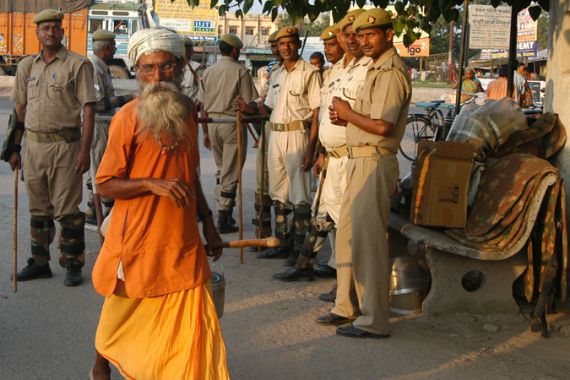Relief in India over Ayodhya ruling
Peaceful reaction to the court verdict on disputed Ayodhya holy site has been welcomed, as fears of backlash fade.

 |
| Indian newspapers have welcomed the compromise nature of the court ruling, which see the disputed site shared [AFP] |
India breathed a sigh of relief on Thursday as a hotly-anticipated court ruling on ownership of a contested religious site was issued without any sign of descent into sectarian violence.
Indian politicians had appealed for calm after a court ruled that both Hindus and Muslims should share a plot of land in the northern town of Ayodhya that is claimed as both a mosque and a temple.
The judges gave control of the main disputed section of the site, where a mosque was torn down in 1992, to Hindus. Other parts of the site will be controlled by Muslims and another Hindu sect.
The dispute over the site flared up in 1992 after a Hindu mob destroyed the mosque and nearly 2,000 were killed in ensuring rioting between Hindus and Muslims across the country.
Manmohan Singh, India’s prime minister, had described the 60-year-old Babri mosque-Ram temple case as one of the biggest security challenges in India.
But despite some Muslims saying they would challenge the ruling, there was no sign of a repeat of the widespread sectarian strife that many had feared the ruling would spark.
“The law and order situation throughout the country has been extremely peaceful,” said P. Chidambaram, the home minister. “We are therefore very pleased and satisfied that the people of India have been respectful and dignified.”
Compromise welcomed
Indian newspapers said on Friday that the peaceful reaction to the verdict heralds a new dawn for the country, which has suffered periodic bouts of sectarian violence over the years.
“The compromise nature of the verdict along with the substantive outcome of dividing the disputed land have restrained any party from claiming outright victory or sulking in total defeat,” the Hindu newspaper said in an editorial. “On balance, the verdict should help the nation as a whole put a longstanding dispute behind.”
Analysts said that the issue was handled well by both politicians and community leaders. “People have shown a great degree of maturity, and politicians too have understood that they cannot ignite anger over the issue,” said R.K. Mishra, a political science teacher in Saket Degree College in Ayodhya.
“I think we can safely say people have grown up and have started focusing on their priorities instead of wasting time and energy over a piece of land,” he added.
But the dispute over the holy site is unlikely to end with the ruling, with Muslims unhappy with only receiving a third of the plot of land.
Syed Ahmed Bukhari, the chief cleric in New Delhi’s main Jama Masjid mosque, said he was “definitely not happy” with the ruling, adding that Muslims would not give up their claims to rebuild the mosque at the site.
Asaduddin Owaisi, a Muslim member of parliament, said on Thursday that “there is anger building up among the Muslim community over the verdict but, god willing, it may not translate into street violence.”
But in Ayodhya, many Muslims were more circumspect about the ruling, with many preferring not to comment on the case for fearing of sparking reprisals from the Hindu community.
“If I say anything then chances are the Hindus will not like it and we will start fighting again,” said Ameen Sheikh Sardar, a Muslim car mechanic in Ayodhya. “We Muslims have decided to remain silent. The less we talk about the disputed land, the better it is for the people of Ayodhya.”